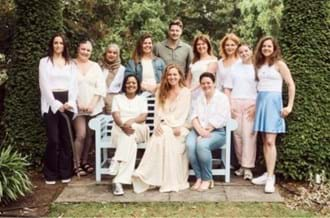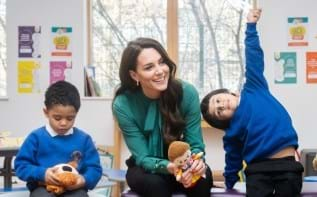The Duchess of Cambridge unveils 5 findings of biggest ever study on the early years
Today, our Royal Patron The Duchess of Cambridge has unveiled the findings of her '5 Big Questions on the under 5s' survey. The research reveals what the UK thinks about the early years, and explores how COVID-19 has impacted parents and carers of under-fives.

The publication of this research follows nine years of work by The Duchess of Cambridge in which she has looked at how difficult experiences in early childhood are often the root cause of key social challenges such as poor mental health, family breakdown, addiction and homelessness.
Published today, the research includes findings from the 5 Big Questions survey, a survey conducted on the impact of coronavirus on families and results from a nationally representative survey conducted before the pandemic. Taken together, these studies have generated 5 Big Insights:
- People overwhelmingly believe that a child’s future is not pre-determined at birth. However, most people don’t understand the specific importance of the early years. Answering the 5 Big Questions, 98% of people believe nurture is essential to lifelong outcomes, but just one in four recognise the specific importance of the first five years of a child’s life.
- The reality of life makes it hard for parents to prioritise their wellbeing. 90% of people see parental mental health and wellbeing as being critical to a child’s development, but in reality people do very little to prioritise themselves. Only 10% of parents mentioned taking the time to look after their own wellbeing when asked how they had prepared for the arrival of their baby. Worryingly, over a third of all parents (37%) expect the COVID-19 pandemic to have a negative impact on their long-term mental wellbeing.
- Feeling judged by others can make a bad situation worse. 70% of parents feel judged by others and among these parents, nearly half feel this negatively impacts their mental health.
- People have been separated from family and friends during the pandemic and at the same time parental loneliness has dramatically increased. Disturbingly, people are also less willing to seek help for how they’re feeling. Parental loneliness has dramatically increased during the pandemic from 38% before to 63% as parents have been cut off from friends and family. The increase in loneliness for parents is more apparent in the most deprived areas. These parents are more than twice as likely as those living in the least deprived areas to say they feel lonely often or always (13% compared with 5%). Compounding this, it seems there has been a rise in the proportion of parents who feel uncomfortable seeking help for how they are feeling from 18% before the pandemic to 34% during it.
- During the COVID-19 pandemic, support from local communities has substantially increased for many - but not for all. Across the UK, communities have united powerfully to meet the challenge of unprecedented times. 40% of parents feel that community support has grown. However, parents in the most deprived areas are less likely to have experienced this increased support (33%) than elsewhere.
These insights highlight that parents and carers need help in understanding the importance of early years and the need to support them to ensure good mental health and wellbeing as they raise their children.
Next year, The Duchess will announce her plans to help raise awareness of the importance of early childhood.
News & blogs

The power of play: from football drills to counselling skills
A reflection by Brendan Kiernan, professional footballer, qualified psychotherapist, and Place2Be Counsellor alumnus.
Read more
Launch of good practice guide for schools - supporting displaced families
Place2Be is proud to have collaborated with Save the Children UK in the creation of a good practice guide.
Read more
Carrie Elizabeth Jewellery launches new collection supporting Place2Be
Carrie Elizabeth Jewellery launches ‘Your Safe Space’, a collection designed to support connection and inner calm.
Read more



